It never happened, and here it is again. Remembering old grievances from Google and calculating the damage from new ones.
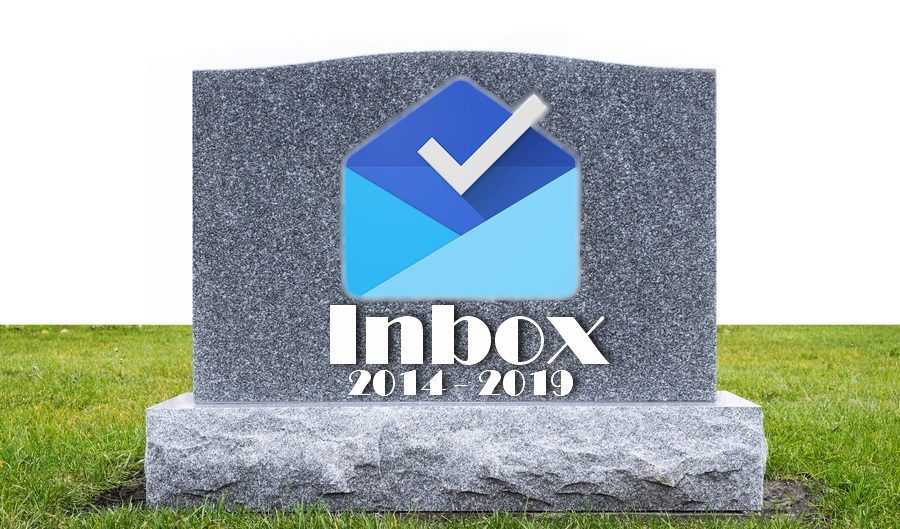
Google's success story is written in a long line of zeros in bank accounts, as well as a line of cups and medals received by the company at annual exhibitions and conventions. The headquarters of Google in Mountain View (California) is a very pleasant place, and there are persistent rumors among journalists about delicious chocolate cakes that programmers of the IT giant devour absolutely free, basking in the subtropical climate. It would seem that such an environment should make people kinder, even if they are marketers and programmers, but, alas, this does not happen.
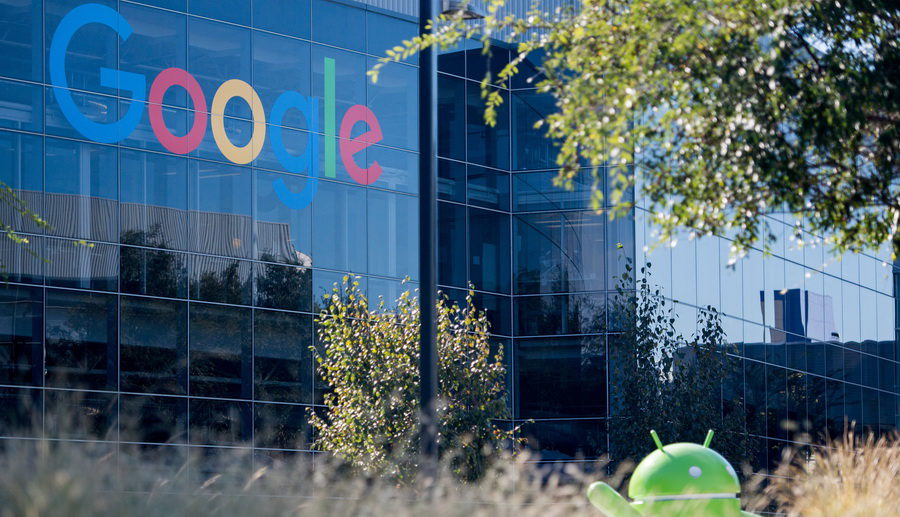
Google, California (photo by JOSH EDELSON)
Most of the population learned about Google during the heyday of DSL internet, which peaked in the early 2000s. Data transfer rates of 128 Kbps and above allowed loading not only blank pages with a search window, but also simple content in the form of images (less than HD), MIDI ringtones and GIF animation. The level of Internet technologies of that time can be judged by the review of Sony-Ericsson T610, released back in 2003. The body of the page contains photos with a resolution of 500×500 pixels, and to view the photos of the device in the interior, follow the link to a separate page. And there are objective reasons for that, this particular review took about 30 seconds to open on my Pentium 4, and 3 more photos of 'T610 in the interior' would have increased the load time to a minute or two. You could start opening the website, go to the kitchen, pour yourself a cup of hot coffee, make a sandwich and be in time for the very 'opening' of the review.
The second part of Google's story is written by users' tears. From the very beginning, something went wrong, when in the bowels of Google a 'give and take' (hereinafter D&C) strategy was developed – this is how you can decide if you think about the past events. Below are the problems generated by Google that cause rejection personally from the author. You can disagree with them and always express your opinion in the comments.
DiZ No. 1 Home
Internet speeds were growing, and at some point, Google decided to give everyone a developer's HYIP. In 2005 (correct if not so), the company announced the Homepage API, and now every literate programmer could adapt third-party content to put it on their Google search home page. Any user who registered in the Google mail could decorate the personal page with third-party links to resources, pictures, widgets and other smart and crazy objects. It looked something like this:
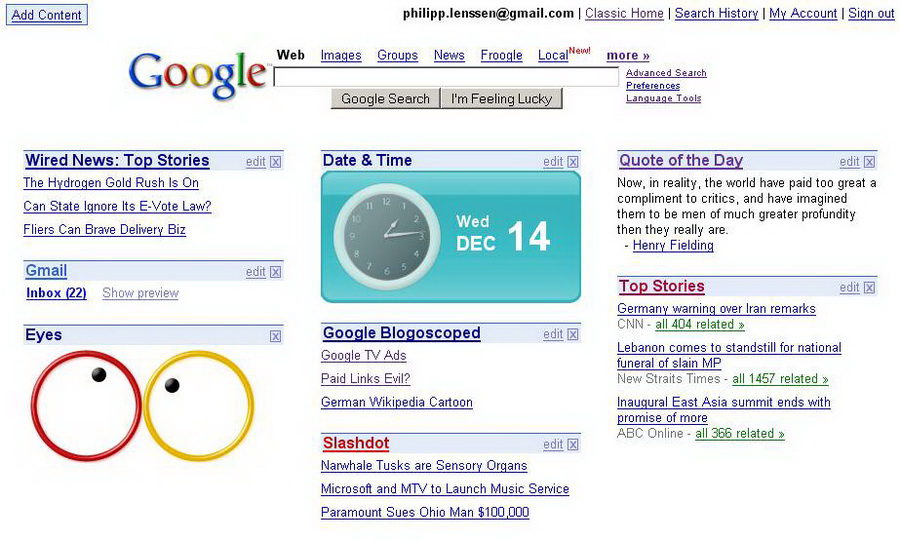
The personal page was tied to a search engine, and not to a specific browser, was stored on Google servers and was subsequently killed by the creators. This is all Google – 'give and take'.
DiZ No. 2 Global
For the first time, the ability to reduce Internet traffic without losing the final meaning was implemented in the Opera browser. At the user's request, the requested page went through the company's servers and was 'relieved'. The unnecessary was cut out of the page, instead of the video, we sculpted a screenshot from it, and instead of pretentious graphics, we saw a blank sheet of text and low quality pictures. As a result, the page 'weighed' several kilobytes, opened very quickly and greatly saved our expenses on mobile Internet.

A similar movement exists in the secret basements of Google, called AMP (Accelerated Mobile Pages) and will very soon take a dominant position in our smartphones. As always with Google, good endeavors come with collisions. In all browsers, such processed (AMP) pages look like an address:
https://cdn.ampproject.org/c/s/
Now imagine a user who sees such an address for the first time. As the saying goes, 'where did I end up' ?! ' There is no feeling that you are watching a 'real' site and this can cause panic, especially in countries suffering from fake news. Google decided to go the unconventional way – just take and remove the display of the network address (URL) from the browser. Not completely remove, leaving only the name of the site. For example, opening any Mobile-Review page, the reader will see the 'Mobile-Review' address and nothing else. Difficulties are inevitable, but it is interesting how the foundations are described in Google itself. One of the leading Google Chrome developers (and just a beautiful woman), Adrienne Porter Felt , simply and unpretentiously says that URLs cannot be used.

Adrienne Porter Felt
There is nothing to add to this, except for the hope that the developers will be smart enough to leave the possibility of a simple transition to the old way of mapping network addresses. And hopes that Google will not put any filters on staging servers related to politics or military intelligence. Although what are we talking about? Of course it will be. Let's see how these experiments end.
DiZ №3 'Give and take' as it is
In 2014, Google announced an 'improved' mail service, Inbox. Along with this, the good old Gmail continued to flourish, and there were persistent rumors on the network that one of the services would not live, “Bolivar cannot bear two”, “this city is too small for two of them” and so on. Leaving aside the fact that the Inbox service comes with a blue icon and runs on iPhone X as opposed to Gmail's red flag, let's focus on the news:
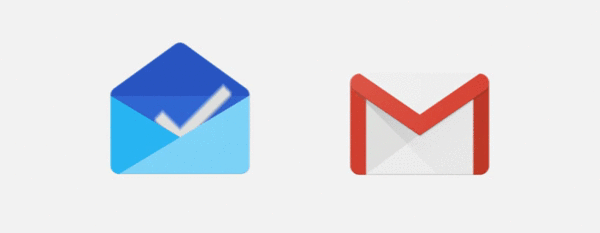
Google decided that it was unprofitable to keep two almost identical services running at once and one of them should be removed. Oddly enough, Inbox became the slaughtering ram, which will be completely destroyed no later than the end of March 2019. What will happen to the owners iPhone, for whom Inbox has become a real lifesaver, a sip of fresh Google in iOS, is not specified, but we already feel sorry for them in advance. Meanwhile, the latest version of Gmail will include all the good (according to the manufacturer) Inbox functions, like adding suggestions for the user, etc. I just want to say: 'To write a letter, now you no longer have to finish school and think, a smart service will do almost everything for you.'
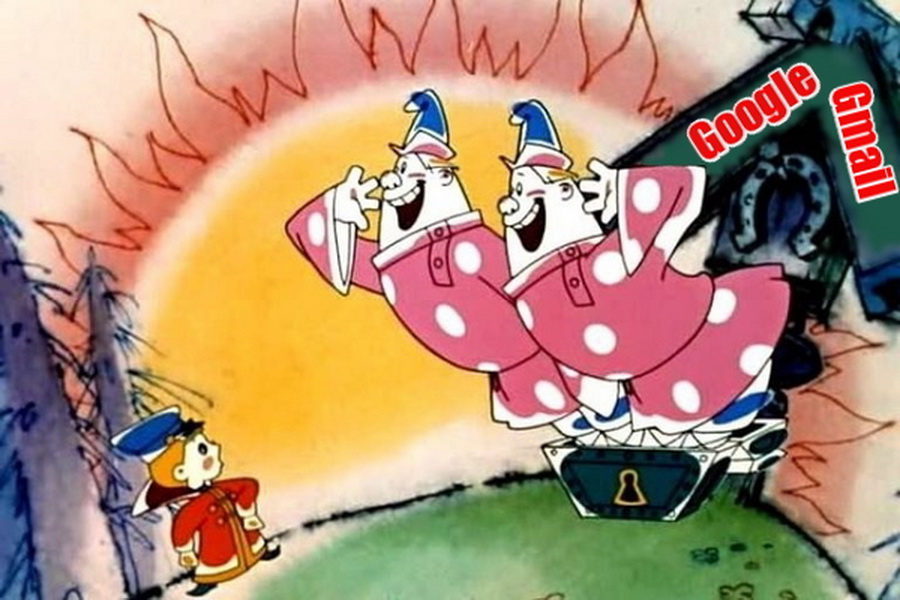
And yet, in some place, Google feels the growing dissatisfaction of users, and in order to somehow smooth out the rough edges, they created a special page, supposedly helping the transition from Inbox back to Gmail. Personally, I have always used Gmail, but I can perfectly imagine the state of the Inbox lovers, whose souls Google has passed with a forged boot.
conclusions
It has become the norm for the company to suddenly close successful services, change them at its discretion, analyze and sell the results of researching the profile of its users (targeted advertising), and control their interests. New 'Opera-like' staging servers and URL hiding in Chrome will give Google the ability to dictate to users what content to watch and what not, what news to read and what not. Perhaps without the right to verify the source. How will Google take advantage of the new opportunities?

Friends, tell us about your Google DZ cases, if any. Or tell us what will stop Google if a company outside the US (this is important) starts filtering the Internet for its users?
